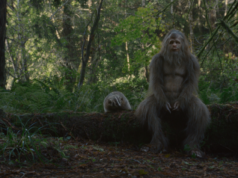Let’s get this out of the way: The reason A Surprise in Texas is getting a theatrical release is because a blind guy won the Van Cliburn International Piano Competition last summer. Don’t believe me? Nobuyuki Tsujii is the only person shown on the movie’s poster.
That’s not why this documentary about the 2009 Van Cliburn Competition irritated me. No, what irritated me was all the stuff that wasn’t there. Having spent two weeks covering last year’s Cliburn Competition in exhaustive detail, I know that it was extraordinarily interesting. You won’t get much of that from the movie, though.
 This is the fourth Van Cliburn Competition covered by documentarian Peter Rosen, going back to 1989. His methods are pretty well set by now: He starts with the contestants arriving in Fort Worth and progresses in an orderly fashion through the preliminary, semifinal, and final rounds. Along the way, he intercuts extensive footage of the performances with talking-heads interviews with the contestants, their host families, and the judges. The blind Tsujii is followed from the start, not surprisingly, along with Bulgarian finalist Evgeni Bozhanov and Russian semifinalist Eduard Kunz, whom we see being refused a drink at Jake’s because he has no ID, despite his protests that he’s 28. (In fairness to the staff at Jake’s, they probably saw the cameras trailing Kunz and figured this was some sort of sting.)
This is the fourth Van Cliburn Competition covered by documentarian Peter Rosen, going back to 1989. His methods are pretty well set by now: He starts with the contestants arriving in Fort Worth and progresses in an orderly fashion through the preliminary, semifinal, and final rounds. Along the way, he intercuts extensive footage of the performances with talking-heads interviews with the contestants, their host families, and the judges. The blind Tsujii is followed from the start, not surprisingly, along with Bulgarian finalist Evgeni Bozhanov and Russian semifinalist Eduard Kunz, whom we see being refused a drink at Jake’s because he has no ID, despite his protests that he’s 28. (In fairness to the staff at Jake’s, they probably saw the cameras trailing Kunz and figured this was some sort of sting.)
Rosen’s focus on the insiders turns out to be stifling and insular. In much the same way that high-level athletes tend to be unrevealing on the subject of how they do what they do, these young classical musicians don’t say much that’s enlightening about the music. (This despite the excellent English spoken by many of the foreign competitors.) Menahem Pressler does most of the talking on behalf of the judges, and he waxes poetic about Tsujii overcoming his handicap. Meanwhile, the only outside criticism comes from a negative Star-Telegram review of Tsujii’s playing, which is quoted and then summarily dismissed. You’d never guess that many other estimable classical music critics have similarly concluded that the Japanese prodigy is still unpolished.
There’s a whole host of other topics that Rosen could have covered, chiefly the improved technology that allowed audiences to experience the 2009 Cliburn in entirely new ways, through the competition’s own web site, YouTube, and the various blogs devoted to the contest, including mine. Co-gold medalist Zhang Haochen receives relative short shrift, both in terms of performance footage and interviews. Other subjects left unexplored include the decline of Russia and the emergence of the Far East as a breeding ground for concert pianists, the unorthodox methods Tsujii uses to learn new music, and what happened with Bozhanov between his magnificent semifinal round performances and his disastrous finals. (We get no hint of the latter.) Rosen also displays little interest in capturing the changing feel of Fort Worth itself. What we see of the city is confined to the Stockyards, the bars, and the houses where the contestants are staying. A stranger to the city might well come away with the impression that this is still Cowtown.
The movie does turn up a few nuggets of inside information. Tsujii reveals that he takes cues from listening to the other musicians breathe, so we hear conductor James Conlon taking in a sharp breath before the big climax of Rachmaninov’s Second Piano Concerto to help the pianist make his entrance in sync with the orchestra. The movie badly needed more of this.
The film also gives audiences the chance to hear these performances through a movie theater’s speakers. Being engulfed in great music is an experience that you can’t duplicate with your TV, PC, or iPod. This is why movie theaters have sold so many tickets to opera broadcasts. If you can’t be in the concert hall, the big screen offers the next best thing. The drawback here is that the movie gives us only one complete performance: Zhang Haochen playing Chopin’s Prelude in B-flat minor. It would have been fantastic to hear all of Kunz’ majestic account of Busoni’s transcription of Bach’s Chaconne in D minor or Di Wu’s magnificent rendition of Rachmaninov’s Third Concerto. The film should have been expanded to two and a half or three hours to include more music.
It seems as if Rosen and company expected Tsujii and his great human-interest story to automatically translate into an uplifting movie simply because it happens in front of the cameras. We all know that it takes a bit more work than that. Bill Fertik’s 1990 PBS documentary The 9th International Tchaikovsky Competition took in crumbling conditions in post-Soviet Russia and expressed a jaded point of view about music competitions in general. Closer to home, Alex Rotaru’s They Came to Play covered the 2007 Van Cliburn Piano Competition for Amateurs and drew absorbing portraits of the contestants. The thoughtful approach of a filmmaker like Rotaru might have turned the 2009 Cliburn Competition’s extraordinary wealth of material into a smart, provocative classical music documentary. Instead, A Surprise in Texas turns all that into something dull and dutiful. l











